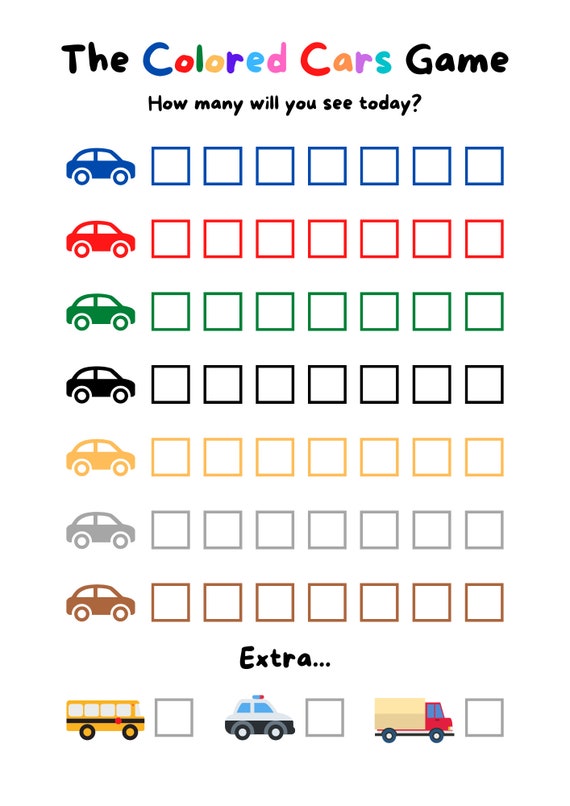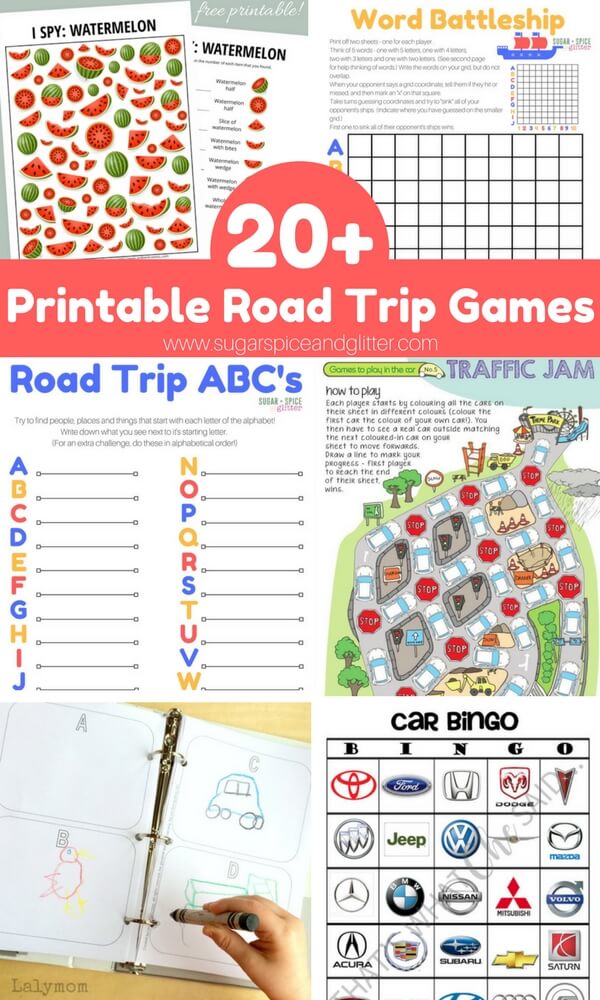The Art Of The Road Trip: Engaging Passengers With Car Games
The Art of the Road Trip: Engaging Passengers with Car Games
Related Articles: The Art of the Road Trip: Engaging Passengers with Car Games
Introduction
In this auspicious occasion, we are delighted to delve into the intriguing topic related to The Art of the Road Trip: Engaging Passengers with Car Games. Let’s weave interesting information and offer fresh perspectives to the readers.
Table of Content
The Art of the Road Trip: Engaging Passengers with Car Games

Road trips, those epic journeys that weave through landscapes and connect destinations, often hold the promise of adventure and shared experiences. Yet, the long stretches of highway can sometimes be monotonous, potentially leading to boredom and restlessness, particularly for younger passengers. This is where car games enter the scene, transforming the journey into an interactive and engaging experience.
Car games, beyond their entertainment value, serve as a vital tool for fostering connection, stimulating creativity, and enhancing the overall enjoyment of the road trip. They bridge the gap between destinations, turning the time spent in transit into a valuable opportunity for shared laughter, intellectual stimulation, and bonding.
The Benefits of Car Games
The benefits of car games extend beyond mere amusement. They contribute to a more positive and enriching road trip experience in several ways:
- Engagement and Entertainment: Car games effectively combat boredom, keeping passengers occupied and entertained throughout the journey. This is particularly crucial for children who might find long car rides challenging.
- Cognitive Stimulation: Many car games require mental agility, problem-solving, and critical thinking, subtly engaging the minds of passengers and preventing them from becoming passive during the trip.
- Social Interaction and Bonding: Car games encourage conversation, collaboration, and friendly competition, fostering a sense of camaraderie and strengthening relationships between travelers.
- Family Time: Road trips often present opportunities for families to spend quality time together. Car games provide a structured framework for these interactions, creating shared experiences and memories.
- Learning and Education: Some car games, such as geography-based ones, can subtly introduce educational elements, expanding knowledge and promoting learning in an engaging manner.
Types of Car Games
The world of car games is vast and diverse, offering a range of options to suit different age groups and interests. Here are some popular categories:
-
Word Games: These games rely on vocabulary, creativity, and linguistic prowess. Examples include:
- I Spy: A classic game where one player chooses an object and gives clues about its color, shape, or location for others to guess.
- Twenty Questions: One player thinks of a person, place, or thing, and the others ask up to twenty yes/no questions to identify it.
- Word Chain: Players take turns saying a word that starts with the last letter of the previous word, creating a chain of connected words.
-
Observation and Memory Games: These games test attention to detail and memory skills. Examples include:
- License Plate Game: Players try to spot license plates from different states or countries, keeping track of their findings.
- Spot the Difference: Players identify subtle differences between two images shown in sequence.
- Memory Match: Players flip over pairs of cards, trying to match them based on their images or symbols.
-
Geography and Trivia Games: These games explore geography, history, and general knowledge. Examples include:
- State Capitals: Players take turns naming state capitals, adding a layer of educational value to the game.
- Trivia Challenge: Players answer questions about various topics, testing their general knowledge and expanding their horizons.
-
Storytelling and Imagination Games: These games spark creativity and encourage imaginative storytelling. Examples include:
- Story Chain: Players take turns adding sentences to a story, building upon each other’s contributions.
- Character Creation: Players invent unique characters with specific traits and backstories, bringing them to life through imagination.
-
Music and Entertainment Games: These games focus on music, pop culture, and entertainment. Examples include:
- Name That Tune: Players guess the name of a song based on its opening notes or a snippet of the melody.
- Movie Trivia: Players answer questions about movies, actors, and directors, testing their cinematic knowledge.
-
Movement and Physical Games: These games involve movement and physical activity, offering a break from sitting in the car. Examples include:
- I’m Going on a Trip: Players take turns adding items to a list, mimicking packing for a trip, and remembering all the items in the order they were added.
- Carpool Karaoke: Passengers sing along to their favorite songs, adding a lively and energetic element to the journey.
Frequently Asked Questions (FAQs)
Q: What are some tips for choosing the right car games for a road trip?
A: The best car games depend on the age and interests of the passengers. Consider the following factors:
- Age group: Choose games appropriate for the age of the youngest traveler.
- Interests: Select games that align with the passengers’ hobbies and preferences.
- Length of the trip: Opt for games that can keep passengers engaged for the duration of the journey.
- Number of players: Choose games that can be played by all passengers, ensuring everyone participates.
Q: How can car games be adapted for different age groups?
A: Car games can be adapted for different age groups by modifying their complexity and rules. For younger children, simplify the rules and focus on visual cues or basic concepts. For older children and adults, introduce more challenging rules and incorporate complex themes.
Q: How can car games be used to promote learning and education?
A: Car games can be used to promote learning and education by integrating educational elements into their gameplay. For example, geography games can introduce state capitals, countries, and landmarks, while trivia games can test knowledge about history, science, and culture.
Q: How can car games be used to foster social interaction and bonding?
A: Car games encourage social interaction and bonding by creating shared experiences and opportunities for conversation. They foster collaboration, teamwork, and friendly competition, strengthening relationships among travelers.
Q: What are some tips for making car games more enjoyable?
A: Here are some tips for enhancing the enjoyment of car games:
- Keep it lighthearted: Focus on fun and laughter rather than competition or pressure.
- Take breaks: Avoid playing the same game for extended periods, and switch to different games to maintain interest.
- Incorporate rewards: Offer small prizes or rewards for winning or participating in games, adding an element of excitement.
- Adapt to the environment: Adjust games based on the scenery or events encountered during the trip, making them more relevant and engaging.
Conclusion
Car games are an essential element of the road trip experience, transforming the time spent in transit into a valuable opportunity for entertainment, engagement, and bonding. By choosing appropriate games, adapting them to different age groups, and incorporating them creatively into the journey, travelers can create a more enjoyable, enriching, and memorable road trip experience for everyone. The art of the road trip lies not only in the destinations but also in the shared experiences and memories created along the way, and car games play a vital role in weaving this tapestry of adventure and connection.








Closure
Thus, we hope this article has provided valuable insights into The Art of the Road Trip: Engaging Passengers with Car Games. We appreciate your attention to our article. See you in our next article!